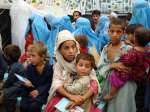High-Level Segment of the 66th session of the Executive Committee of the High Commissioner's Programme on the Afghan refugee situation. Closing remarks by António Guterres, United Nations High Commissioner for Refugees, 7 October 2015
Excom speeches, 7 October 2015
Edited transcript of extemporaneous remarks
First of all, this meeting would not have been possible if for decades the Islamic Republics of Iran and Pakistan had not so generously hosted such a large number of Afghan refugees. I am very happy that this declaration represents full recognition by the international community of that solidarity, expressed in a way that is clearly in line with the best of the hospitality of both the Iranian and the Pakistani people, but also clearly anchored in the best of the Islamic tradition of refugee protection.
When we were preparing this meeting, two questions were sometimes asked. First, does it make sense to discuss voluntary repatriation to Afghanistan at a moment in which we have so many security challenges in Afghanistan. I totally reject the idea that in a conflict situation we first have to end the conflict to start the development and stabilization process. The two things need to go together. It is impossible to end the conflict if at the same time the economic and social aspirations of the people are not met and the stabilization of the populations does not take place. It is exactly because the situation is challenging that the commitment of the international community, so clearly expressed by the delegations here, needs to be stronger, supporting Afghanistan in order to create the conditions, not only to allow its people to benefit from all the aspects that constitute the life of a modern country, but also to allow for this population to stabilize. The voluntary repatriation in safety and dignity to the areas where that repatriation is possible is a key element of that stabilization. This is the best way to also allow for the conflict to be overcome.
The second question that many people asked was, there has been such strong economic support to Afghanistan, many delegations mentioned the hundreds of millions or even billions of dollars that have been spent. Why now support voluntary repatriation if in the past many things have not worked as we would have liked in that regard? Let's not forget that 5.8 million people already went back to Afghanistan, and this has represented an enormous pressure on the resources and capacity of the country. But there is now something new that creates a unique opportunity, and that is the very strong commitment of President Ghani and of the Government of Afghanistan to make voluntary repatriation of refugees and return of internally displaced persons one of the first line priorities of Government action, and to use the National Solidarity Programmes and the National Priority Projects to create the conditions for that return to be successful and sustainable. This is an opportunity we cannot miss, because if this opportunity is missed and if there is no massive investment from the international community to make it happen, the challenges that I was mentioning can become a disaster that everybody wants to avoid.
It is important to take some concrete dimensions of what was decided in the resolution. First, it is essential to support financially and technically the projects that the Government of Afghanistan is putting on the table for this return to be successful and to lead to a harmonious integration of refugees in Afghan society. Secondly, recognizing the difficulties of that process, it is important to support the families themselves. That is the idea of the Enhanced Voluntary Return and Repatriation Package, which can be done in a perfectly safe manner, avoiding fraud and any kind of deviation because it can be done through mobile technologies, through mobile phones and the system that is in place in Afghanistan and can be, as a matter of fact, monitored by the donors themselves in articulation with the Government of Afghanistan. This is a project in which we are sure that the money will go directly to the families that need it, to allow them to have a house, to allow them to start a business and to allow us, to a certain extent, to complement the effort that the Government will be making. At the same time let's not forget that the international community should enhance its resettlement programs of Afghan refugees and the support to the host states and host communities.
I think this has been an excellent opportunity to bring unity to the action of the international community, in full support of Afghan refugees, in recognition of the determined priorities of the Afghan Government, and also to express the appreciation of us all to what has been the extremely generous contribution of the Islamic Republics of Iran and Pakistan to refugee protection, which deserves not only appreciation but full support in their also very challenging response to this dramatic human situation.
Thank you very much to all of you.



















































